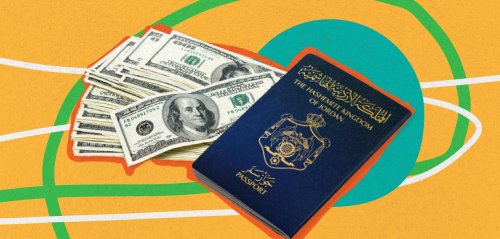History has always been my favorite subject throughout my school years. I loved studying the succession of states and kingdoms, how each country that tightened its grip on Egypt affected the nature of Egyptians and their way of life, and how those who entered it were affected by it and its people. Studying history, I saw the rise and fall of states and kingdoms. Whenever one dies, another is born to follow it.
The recurrence of events extends along the timeline in such a way that prompts you to wonder how humans haven’t become good at reading history in order to avoid the mistakes of the past. I remember a question that was always repeated regarding the fall of one state and the rise of another: "With what do you explain the collapse of the state?", and there’s always the reason: "The migration of skilled labor, craftsmen, and business owners".
"With what do you explain the collapse of the state?", there’s always the reason: "The migration of skilled labor, craftsmen, and business owners"
From a socio scientific point of view, there is a category of immigrants that the usual classifications of the types and causes of migration do not apply to. European countries define them as "professional expatriates”, or what is more commonly known as a "business expatriate" and what is colloquially known as an “expat”. The origin of this word comes from the Latin language, “ex” means "out of", while the word “pat” goes back to the word “patria”, which means "country" in Latin.
This type of immigration is described as the recruitment of individuals to work legally and temporarily in another foreign country for a maximum period of five years to achieve a professional goal, regardless of the type of this work or its financial compensation, and the companies wishing to hire recruit these individuals for work.
Looking at the Netherlands in particular, it is one of the most qualified countries in the world for work and recruitment, especially in the field of information technology and programming. Studies published in 2015 indicate that the number of recruits to work in the Netherlands in all fields ranged between 39,000 and 75,000, 50% of whom work in vital cities such as Amsterdam, Rotterdam, The Hague, Utrecht and Eindhoven, which reflects their impact on the industrial and economic side. The IWCN center, which provides services to foreign expatriates in several Dutch cities, describes qualified people as economic activists, whose educational degrees and professional experience enable them to collectively influence the Dutch economic and industrial situation.
Why does the Netherlands bring in skilled talent?
The Netherlands is known to be a high-tax country, and the cost of living is quite high when compared to other European countries. Despite this, it follows several policies regarding those coming to work, labeling them under the category of highly skilled immigrants. These policies include a tax exemption of 30% for a period of five years, and companies wishing to recruit cover the travel costs of the recruited worker and his family. Some companies also offer to pay part of the costs of international schools in the event the recruit has children. In addition to providing social and psychological support to overcome the difficulties of integrating into society, companies also often provide a temporary home for the recruited worker until he can find a house for rent. The Dutch government exempts qualified individuals and their families from the compulsory integration pathways and all required local language and culture tests, leaving them the freedom to learn the language or not, considering that their residence is temporary until it is decided otherwise, and in return the residence permit remains conditional on the work contract, and expires upon its expiry.
The biggest driver for bringing talent and qualified individuals to Europe is the lack of qualified local workers for many jobs
The biggest driver for bringing in talent and qualified individuals is the lack of qualified local workers for these jobs. The Amsterdam Economic Board notes that the need for technical talent in the field of computers in the Netherlands has doubled, as the number of vacancies in the field of information technology is greater than the number of talents and competencies in the Netherlands. The percentage of vacancies in 2018 amounted to 46% of the total number of jobs for software engineers, while the number of vacancies in the field of software engineering in 2016 was ten thousand jobs.
The lack of local competencies is the reason behind recruitment in most cases, and if local competency is available – according to the source – then its lack of basic skills for this job remains an obstacle, in addition to the high expected financial compensation for local job applicants, as competence here and the level of education are not equivalent to the required financial compensation. The Netherlands' need for computer science and software engineers has become central to its importance in all branches of work, which prompts companies to search for workers from abroad.
Brain drain
On the other hand, these migrations drain the home countries of their competent minds in what is scientifically known as ‘brain drain’. The scientific website Target Study defines this term as “large emigration of individuals with technical skills or knowledge” for several reasons, including “conflict, lack of opportunity, political instability, or health risks”, which can expose the home country to high economic costs. Countries exporting this type of human resources are getting poorer as a result of the filtering of their talents and qualified individuals, in addition to the low quality of local technical products in these countries.
These migrations drain the home countries of their competent minds in what is scientifically known as ‘brain drain’
The term was coined by the international scientific community after the massive emigration movements of qualified individuals, "scientists and technologists" to North America and Europe after World War II. Studies on this matter have documented a relationship between the educational accomplishment of individuals in developing countries and their interest to migrate and travel to foreign countries.
The opposite term for brain drain is ‘brain gain’, which means the long-term profit that host countries reap from qualified individuals after they migrate to them. The source adds that the majority of countries suffering from brain drain are “the former colonies of Africa, certain regions of Asia, the island nations of the Caribbean”, and their presence after migration is concentrated in European and North American countries that have achieved significant economic and scientific gains as a result of these migrations.
The opposite term for brain drain is ‘brain gain’, which means the long-term profit that host countries reap from qualified individuals after they migrate to them
Mohammad Mokhtar (pseudonym), a software engineer in the Netherlands, recounts his experience trying to start his own software company in Egypt in 2015. He says he faced great difficulty in the required legal procedures, as he tried to obtain the necessary papers for this company. This was expected for him, but what was not expected was for a military company to ask to share in the profit that this company would make without giving any financial support in return. For him, this was like a sort of "royalty". Mohammad suffered from various legal and security restrictions after he refused this offer, and then made the decision to emigrate abroad and not return. There are many stories similar to this one whose owners eventually had to migrate without return in search of safer job opportunities outside their home countries.
Escaping the Arab Spring
There was a clear difficulty in obtaining information about the numbers and rates of individuals migrating from the mother country during the preparation of this report. Sociologist Philippe Fargues in his book "Migration From North Africa and the Middle East: Skilled Migrants", attributes the reasons behind this scarcity of information to the fact that it may cause embarrassment to these countries about the reality of their situation regarding the migration of skills, while the host countries benefit from the publication of this data, and therefore the mother country prefers to ignore data related to this type of migration, according to what Fargues states in his book.
Fargues attributes the recent severe spike in immigration, to the Arab Spring, and the consequent lack of job security or stable political conditions in the Middle East. In his view, immigrants are looking for safer countries that will provide them with greater job and social stability.
"I now have all the time to recover from the effects of political frustration. We did everything in our power to bring about change in January 2011, and I have no choice but to leave in order to escape the tightening security grip." This is what Ayman (pseudonym), a software engineer in the Netherlands, said when asked about the reasons for his emigration to the Netherlands in 2017. The financial return was not one of the reasons that led him to emigrate. He states that his work in Egypt provided him with a relatively high financial compensation that enabled him to live a comfortable life, revealing that his emigration was mainly to escape the political and social conditions that Egypt has recently reached. Ayman sees that everyone who believed and participated in the "January Revolution" has no choice other than be arrested or emigrate, and therefore his choice was to leave and work to achieve job stability in another country.
"We did everything in our power to bring about change in January 2011, and I have no choice but to leave in order to escape the tightening security grip" – Ayman (pseudonym), an Egyptian software engineer in the Netherlands
The four modes of acculturation
For twenty years, researchers have conducted studies to find out the percentage rates of talented and skilled individuals migrating from developing countries to the north, especially Arab countries. Agnieszka Golec, Professor of Social and Political Psychology at the University of London, monitors the percentage of skilled immigrants from Egypt in 2000, which is 4.2% of the total qualified people in the country, and compares it to the percentage of qualified immigrants from Lebanon, for example, in the same year, which amounted to 29.7%. Golec also found that the stock of highly skilled immigration in a country like the United Kingdom exceeded one million workers in 2000, while in the Netherlands it exceeded 241,000 workers in the same year. Agnieszka reported these figures in her book "Social Psychology of Social Problems: The Intergroup Context".
A source affiliated with the World Bank indicates that the number of high-skilled migrants to EU countries with skilled or post-university education increased between 2004 and 2018 from 2.8 million to 8.3 million. The book attributes the reason for this increase to the technological boom witnessed at the beginning of the new millennium, which led to an increase in the need for workers in the information and communication technology (ICT) sector. According to the source, the majors of software and application developers come in first place among the majors occupied by skilled immigrants in Europe, followed by the engineering major.
"Assimilation, integration, separation, and marginalization", the four modes of acculturation, according to Agnieszka Golec, Professor of Social and Political Psychology at the University of London
In her book, Agnieszka pays attention to how this group of migrants integrates into the host societies at the social level, more than on the economic impact on the home and host countries, tracing the possible paths in the new society. She introduces the term "acculturation" as the social process that is practiced within societies that contain more than one nationality. Golec narrows the modes of acculturation to four terms: assimilation, integration, separation, and marginalization.
The immigrant determines his path – according to Agnieszka's vision – by following one of these modes, either by building social relations with the citizens of the new community without the members of his original community of immigrants, which is known as assimilation, or by limiting his social relations to individuals who share his cultural background without the citizens of the new community, a state that the author defines as separation. Whereas in the case of the individual balancing his social relations with all segments of society, this is what she defines as integration. And finally, if the individual chooses not to care about building social relations at all, then he adopts the path of marginalization.
Selecting a mode
Immigration in this category of immigrants takes an individual form in the first place. It starts with one immigrant applying alone to a job abroad, then receiving the acceptance letter and a job offer, and then traveling. The immigrant then comes to a new country and begins to explore the society around him. Over time, these multiple individual beginnings produced small communities within the host country. The biggest choice in the lives of skilled immigrants is whether to continue their lives in the host country or elsewhere abroad, or to return to their mother country, especially since the countries that bring in qualified individuals does not force them to practice social integration and follow the courses designated for this, and so their residence permits remain tied to their jobs, so the four paths that Agnieszka put forward in her book remain a tried and tested subject for this category of immigrants.
Post-university education and job experience are the real wealth that this group of immigrants has invested their time and money in preparing. There are families in our Arab countries who believe that education is the future, so they made a long-term investment in their children. They put all their savings into their education, even though they did not have a clear vision of what this investment would bring in the future, but they believed that it was the most viable investment. These families constituted the middle segment of Arab societies that did not possess power or wealth, but who only had the ability to dream and believe in education as a powerful force.
In a press conference, President Sisi asked: "What’s the benefit of education within a lost homeland?" That is why immigration to a country that accommodates our dreams was our savior
In a press conference, President Sisi asked: "What’s the benefit of education within a lost homeland?" That is why immigration to a country that accommodates our dreams was our savior. With the sharp political fluctuations that the Middle East witnessed, there was no longer enough space in the homeland to accommodate the stockpile of dreams and education that the founding fathers spent on this generation. This generation has had to pay other taxes such as alienation from their homeland, eternal nostalgia for what life was, dealing with cultural, environmental and linguistic differences, long-term feelings of guilt and feeling like they are negligent towards their parents, and building other countries instead of their homeland, just because there are other countries that have expanded to accommodate what the homelands had been too small to hold.
Raseef22 is a not for profit entity. Our focus is on quality journalism. Every contribution to the NasRaseef membership goes directly towards journalism production. We stand independent, not accepting corporate sponsorships, sponsored content or political funding.
Support our mission to keep Raseef22 available to all readers by clicking here!
Interested in writing with us? Check our pitch process here!












Join the Conversation
ذوالفقار عباس -
3 hours agoا
Hossam Sami -
3 hours agoصعود "أحزاب اليمين" نتيجة طبيعية جداً لرفض البعض; وعددهم ليس بالقليل أبداً. لفكرة الإندماج بل...
Anonymous user -
1 day agoرائع و عظيم ..
جيسيكا ملو فالنتاين -
5 days agoزاوية الموضوع لطيفة وتستحق التفكير إلا أنك حجبت عن المرأة أدوارا مهمة تلعبها في العائلة والمجتمع...
Bosaina Sharba -
1 week agoحلو الAudio
شكرا لالكن
رومان حداد -
1 week agoالتحليل عميق، رغم بساطته، شفاف كروح وممتلء كعقل، سأشاهد الفيلم ولكن ما أخشاه أن يكون التحليل أعمق...